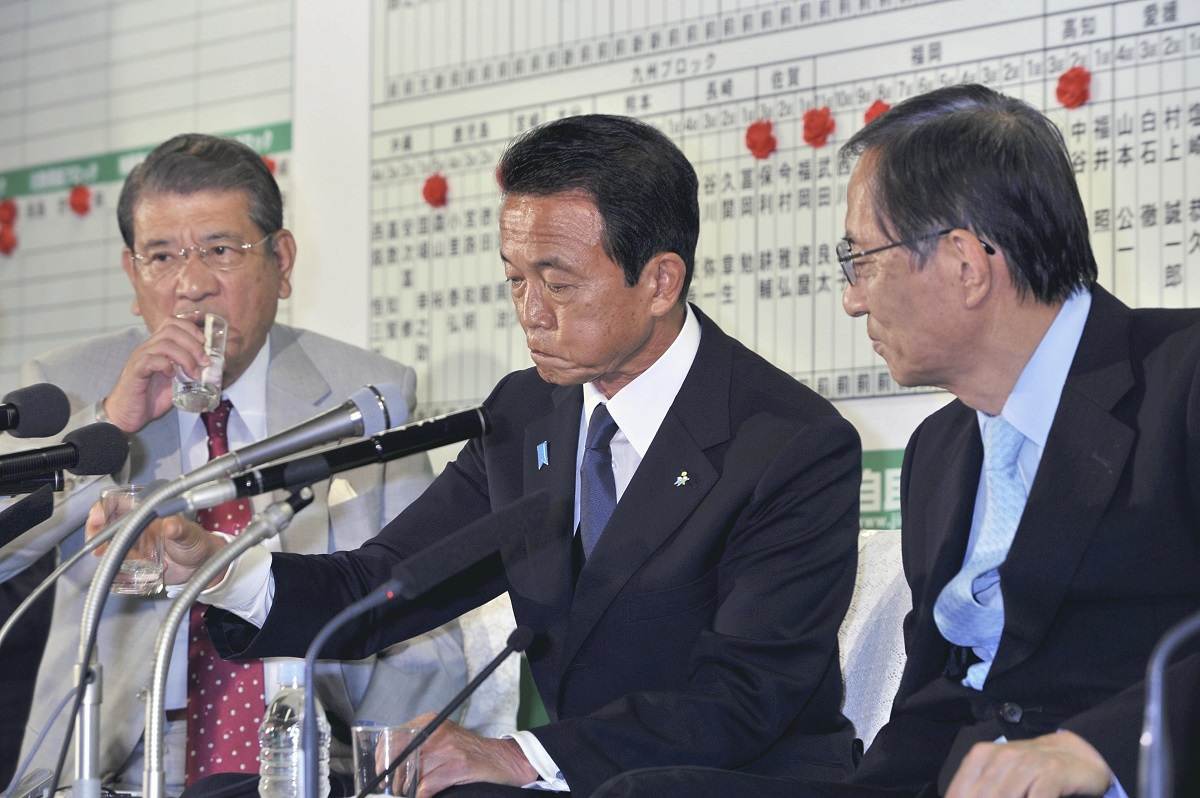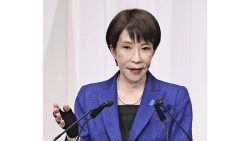
Then Prime Minister Taro Aso and other LDP leaders look grim at a press conference at Liberal Democratic Party headquarters in Tokyo on Aug. 30, 2009, the day the LDP last lost a general election.
8:00 JST, March 23, 2024
“Nation sees historic change” read the headline of one national newspaper when Yukio Hatoyama, president of the Democratic Party of Japan, was elected as Japan’s prime minister. The party had just ousted the long-dominant Liberal Democratic Party in the House of Representatives election of August 2009.
More than 15 years earlier, a coalition government led by Prime Minister Morihiro Hosokawa was formed and the LDP was forced from office for the first time since the party’s establishment in 1955. At that time, too, a newspaper article described the transfer of power as a new chapter in Japanese history.
As incoming prime ministers, Hosokawa in 1993 and Hatoyama in 2009 had gained overwhelming popularity, and many voters were filled with a sense of exhilaration. But within less than a year, their governments had caused such confusion and so many conflicts that the people’s confidence in them was lost. In both cases the LDP ultimately returned to power.
In Japan, transfers of power have happened on very rare occasions. During the LDP’s 69-year history, the party has handed over the reins of government to the opposition on only those two occasions. The total duration of the LDP’s time out of power came to just four years. It is a brief period compared to parties in other democratic nations.
In countries that have a parliamentary cabinet system, such as the United Kingdom, Germany or Canada, transfers of power have taken place every few years or after a maximum of less than two decades. Britain has had power transfers six times since 1955, when the LDP was set up. During this time, the Conservative Party of Britain has been in opposition for more than 20 years in total.
The LDP was seen as a nearly permanent ruling party and still has a strong ability to cling to office. Even so, no one can say that a transfer of power in which the LDP suffers a landslide rout in the next general election and falls from power will not happen.
At the moment, Prime Minister Fumio Kishida’s administration is trapped in a political funds scandal embroiling the largest faction of the LDP, the Abe faction. His Cabinet’s approval rating has languished below 30% for four consecutive months. This is the lowest approval level for a cabinet in a decade. Compared to his predecessors Shinzo Abe and Yoshihide Suga, Kishida is the least popular prime minister of the three.
Yet, Kishida seems not to be convinced of his administration’s policy failures. He boasts about a recovery of the economy and continuing hikes in workers’ wages. What is more, prices on the Tokyo Stock Exchange have hit a record high, breaking a more than three-decade-old record.
If these trends continue, the Kishida administration will manage to bring the economy out of the lingering deflation that has plagued Japan since the bursting of the bubble economy in the early 1990s. More than 15 prime ministers before Kishida tried to overcome deflation but failed.
Amid distrust of the government caused by the LDP’s political funds scandal, Kishida has tried to take the initiative. He dissolved his own faction and vowed to do away with faction-led politics, even though he was pressured not to do so. Kishida should be credited with trying to redress the LDP’s longtime bad practices.
This better economic situation and his political tactics contrast with his low popularity. To explain the gap, it can easily be seen that the Kishida administration’s support base is shrinking, and it is going to be hard for it to recover. In a recent poll conducted by The Yomiuri Shimbun, his Cabinet’s approval rating among LDP supporters is about 60%. It has declined by a third from its peak a year and a half ago.
The LDP has reported that the number of rank-and-file party members declined by about 30,000 last year, or about 3%. LDP supporters may have become extremely tired of the continuous scandals involving the party’s Diet members, or feel a lack of leadership in the Kishida administration.
Now most LDP Diet members are facing a stiff headwind in their constituencies. If things get even worse for them, they will call for a change of party leader. Some Diet members might even break with the party, which happened in 1993 and 2009 just before the LDP became an opposition party in those elections.
While facing a crisis, will the LDP do nothing and accept a situation that may lead to a transfer of power? I do not think so.
Looking back at the LDP’s long history, it has always taken measures of last resort to remain in power. In other words, removing an unpopular prime minister and replacing him with someone unexpected. One example is that the LDP elected Junichiro Koizumi, who had seemed an outsider and a lone wolf, as president of the LDP and prime minister in 2001. As a result, the LDP won a landslide victory in the House of Councilors election, a contest in which the LDP had been anticipating a devastating defeat some months before.
In 1994, the then-opposition LDP supported Tomiichi Murayama, a leader of its longtime rival the Socialist Party of Japan, in the election for prime minister and was thus able to return to power.
This time around, will some LDP leaders aim to elect Japan’s first female prime minister? The likely candidates are Foreign Minister Yoko Kamikawa, economic security minister Sanae Takaichi, and Tokyo Gov. Yuriko Koike. Koike is one of the most influential political figures in Japan and could be an ace in the hole for the election, though many think she will not run for prime minister.
Otherwise, Kishida could gamble on an unorthodox foreign policy stunt such as a sudden visit to Pyongyang to resolve the Japanese abduction issue as a way to regain his popularity.
In any case, the LDP leaders and Diet members face a challenging task to show that they have the survival skills demonstrated by their predecessors.
Political Pulse appears every Saturday.

Takayuki Tanaka
Takayuki Tanaka is senior managing director, chief officer, administration, of The Yomiuri Shimbun. His previous post was managing editor.
Top Articles in Editorial & Columns
-

40 Million Foreign Visitors to Japan: Urgent Measures Should Be Implemented to Tackle Overtourism
-

University of Tokyo Professor Arrested: Serious Lack of Ethical Sense, Failure of Institutional Governance
-

Policy Measures on Foreign Nationals: How Should Stricter Regulations and Coexistence Be Balanced?
-

Greenland: U.S. Territorial Ambitions Are Anachronistic
-

China Provoked Takaichi into Risky Move of Dissolving House of Representatives, But It’s a Gamble She Just Might Win
JN ACCESS RANKING
-

Japan Institute to Use Domestic Commercial Optical Lattice Clock to Set Japan Standard Time
-

Israeli Ambassador to Japan Speaks about Japan’s Role in the Reconstruction of Gaza
-

Man Infected with Measles May Have Come in Contact with Many People in Tokyo, Went to Store, Restaurant Around When Symptoms Emerged
-

China Eyes Rare Earth Foothold in Malaysia to Maintain Dominance, Counter Japan, U.S.
-

Australian Woman Dies After Mishap on Ski Lift in Nagano Prefecture






















